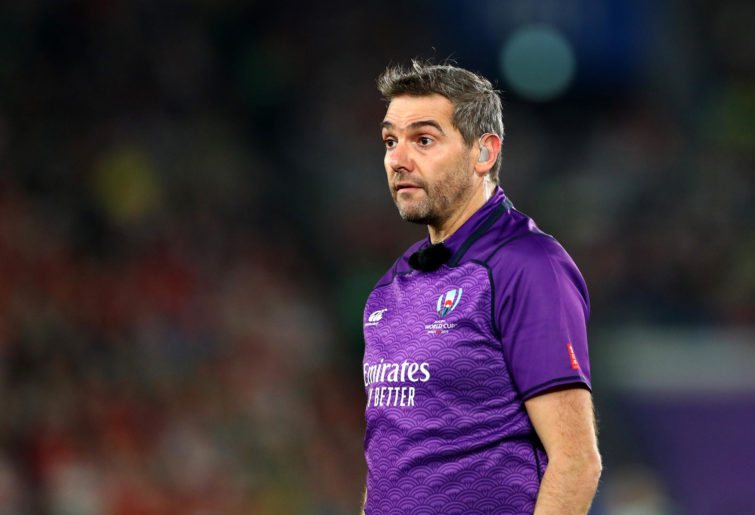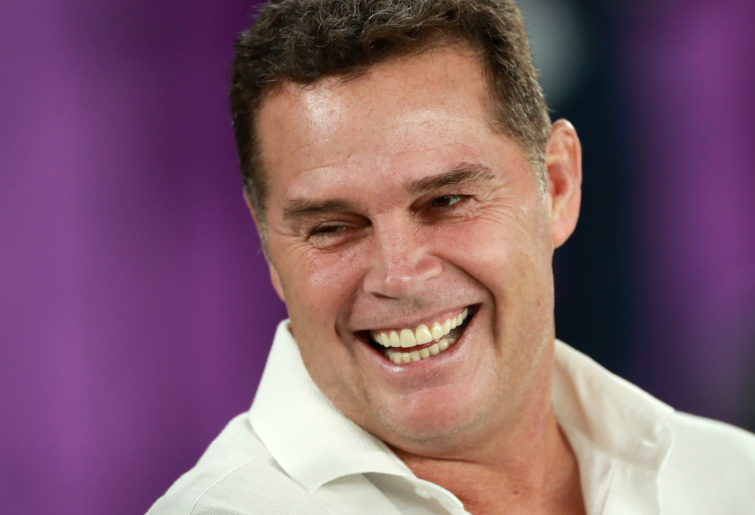Let me be blunt: it will be a disaster for rugby as an inventive, clever and attractive game to play and watch if the Springboks win the World Cup final playing the thuggish, boring, one-dimensional rugby they employed to defeat Wales in the semi-finals.
The semi-final, with Wales also playing one-dimensional, brain-dead rugby, was the most boring World Cup match since the 2007 final between the Springboks and England.
On last Sunday night there were 81 kicks inflicted on a massive audience at the ground and around the world by two teams that were determined not to lose.
The previous night the rugby world was treated to a match that was totally engrossing, as a spectacle and an intellectual pleasure, as the All Blacks struggled to get out of a masterful straitjacket imposed on them by a brilliant England side who switched effortlessly between effective attack and shuddering defence.
This match was refereed brilliantly by the Welshman, Nigel Owens.
Owens established a rapport with the players on both sides that encouraged them to use all 15 players on the field, which is the essence of the spirit of the rugby game.
The Springboks-Wales match, on the other hand, was refereed erratically and nervously by Jerome Garces.
The players responded to this refereeing performance by Garces by doubling down on their negative game plans in a way that suggested they did not trust Garces to allow them to play open and free-wheeling rugby.
This is what usually happens when Garces referees a big match.
So it is bizarre that World Rugby has announced that Garces, rather than Owens, will referee the final of the 2019 Rugby World Cup tournament.

(Photo by Francois Nel – World Rugby/World Rugby via Getty Images)
This is the showcase match of the tournament with its massive world-wide audience tuning in.
The statement issued by World Rugby announcing the Garces appointment stated this: “The appointments were made after comprehensive review of the weekend’s semi-finals by the World Rugby Match Officials Selection Committee comprising Chairman Anthony Buchanan (council member), Joel Jutge (EPCR), Lyndon Bray (SANZAAR), Nick Mallett (international coach) and Alain Rolland (World Rugby).”
How this group of rugby experts could rate Garces’ refereeing performance as better than Owens’ is a mystery.
The argument against the appointment of Garces is entirely about his refereeing style. It is a nit-picky, nervous, sometimes eccentric style that does not encourage teams to play adventurous and attractive rugby. The games that Garces referees are rarely entertaining affairs.
This style suits the unadventurous and negative game plan adopted by the Springboks so far in the finals.
Exhibit A is the truly awful semi-final between the Springboks and Wales that Garces refereed. Garces is the referee as a policemen. He is forever on the lookout for an infringements. As a consequence of this method, too many of his matches end up as boring penalty shoot-outs. The Springboks-Wales semi-final proves that.
Owens is the referee as a manager. He referees to prevent infringements from being perpetrated. The Owens style goes back to the exuberant and open method of the first referee to control a World Cup final, the Australian Kerry Fitzgerald of blessed memory.
Fitzgerald, like Owens, had a refereeing technique that saw his role as enabling the players to play as well and as expansively as they could. The first final under Fitzgerald – between New Zealand and France in RWC 1987 – was an entertaining and dynamic match, one of the best finals in terms of a spectacle in World Cup history.
Ensuring that the final is an exciting spectacle is important because millions and millions of people who are not rugby enthusiasts tune in.
Unfortunately, Fitzgerald passed away as a relatively young man. The officials who followed him as World Cup finals referees – Derek Bevan (1991), Ed Morrison (1995), Andre Watson (1999, 2003), Alain Rolland (2007), and Craig Joubert (2011) to a lesser degree – tended to referee as policemen and not as managers.
So why wasn’t Owens appointed to the control the final after his superb performance in the England-New Zealand semi-final?
None of this takes away from the massive turnaround that Rassie Erasmus has achieved with the Springboks.

(Photo by David Rogers/Getty Images)
Two years ago, the Springboks had no chance of getting through to the World Cup final. They had lost to Italy! Had been thrashed 57-0 by the All Blacks, the worst defeat ever in the history of the Springboks. And then were smashed by Ireland in another record defeat. Under coach Allister Coetzee, the Springboks won only 11 of 25 Tests.
It is important to note that Rassie Erasmus – who combined the director of rugby job with Boks head coach role – came into this World Cup losing only one Test this year and winning the Rugby Championship.
Rugby Australia was going through the same crisis as the South Africa about a losing coach. Rugby Australia decided to stick with Michael Cheika, a decision that has proved to be a disaster.
All credit to Erasmus for turning around the fortunes of the Springboks.
During the pool round matches – during which the Springboks lost a close, tense match to the All Blacks – the South Africans scored more points (185) and more tries (27) than any other team. They virtually closed up shop, though, in the quarter-final against Japan and the semi-final against Wales.
There has been a tendency to write off the Springboks after these lacklustre but brutal performances in the finals. People who do this, however, do not understand the Springboks’ history in the World Cup.
The Springboks, even more than the All Blacks, have been the outstanding side in World Cup tournaments. The All Blacks won three of their nine tournaments from RWC 1987 through to RWC 2019.
The Springboks played their first World Cup tournament in 1995. They won two of their first six tournaments, and in their seventh this year, they are in the final with a chance to equal the All Blacks’ haul of silverware.
This suggests that their traditional game plan – the kick-and-smash style – is very effective in World Cup finals.
It should not be forgotten, as well, that the Springboks came within two points of defeating the All Blacks in their 2015 semi-final.
The last time the Springboks played England was last year at Twickenham. England won 12-11 after being smashed in the first half. This loss by the Springboks exposed the dangers of their kick-and-smash style. They can be totally dominate but not accumulate points through tries, unless the opposition collapses.
Generally, the Springboks rely on successful penalties to win matches.
A side with a more varied suite of styles – like England in this World Cup – could take the game away from the Springboks if they do not concede penalties and score, say, two tries themselves.
According to John Mitchell, England’s defence coach, the Springboks’ power game does not worry them as much as it might other teams.
“What we are going to witness are the two most powerful rugby teams in the world,” he said. “They are strong, well-coached, the gain line is going to be huge… Going back to our DNA, we feel it is really important for us.”
On the evidence of the two semi-finals, I am going to write something I never thought would be recorded on my laptop.
I want England to win the 2019 World Cup final playing the smart, efficient, hard-shouldered rugby they used to boot the All Blacks out of the tournament.






























































































